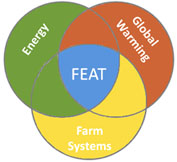Current Projects
Sustainable Dairy Cropping Systems--Penn State
We are evaluating ecological strategies for an average-sized, Pennsylvania dairy farm to produce all of its forage, feed, and tractor fuel needs, and to minimize off-farm inputs. We have designed two diverse crop rotations with legumes, green manure and cover crops, no-till, manure injection and integrated pest management practices. Canola is grown for fuel for the straight vegetable oil powered tractor, and the meal is a protein source for the cows. FEAT is being used to evaluate these cropping systems in terms of farm fuel self-sufficiency, energy, and greenhouse gas (GHG) emissions.
o The Farm Energy Analysis Tool (FEAT) was used in this analysis to compare energy, greenhouse gas emissions, and crop production of five different cropping systems. The five cropping systems consisted of: 1) no-till; 2) conventional; 3) organic 2-yr; 4) organic 3-yr; 5) organic 6-yr.
The Farm Energy Analysis Tool (FEAT) was used in this analysis to compare four organic and two conventional cropping systems in terms of energy, and GHG emissions

